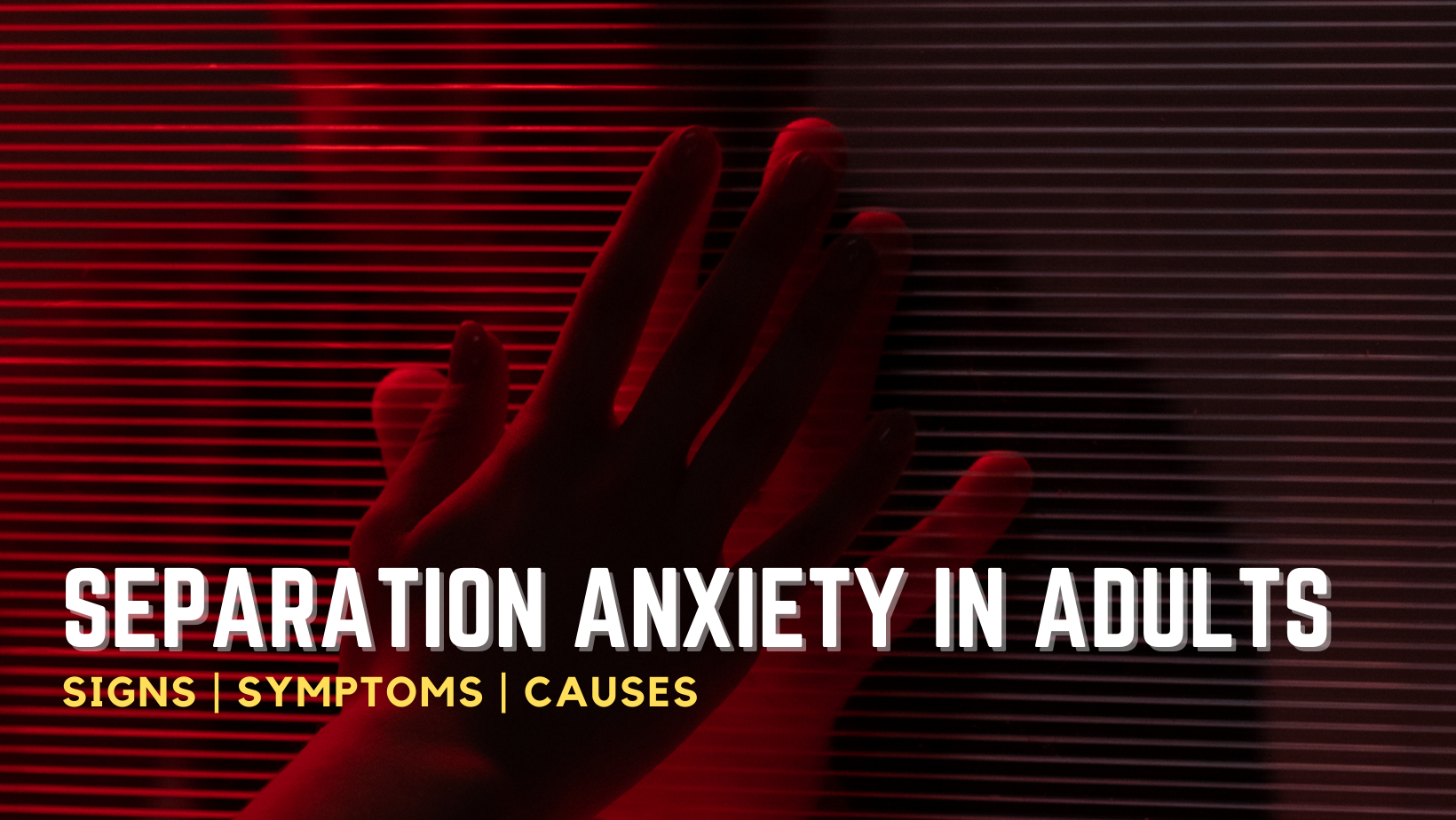Hey there, dear reader! If you’ve clicked on this post, chances are you’ve heard of separation anxiety in children, but did you know adults can experience it too? It’s a reality that often goes undiscussed, leaving many to suffer in silence. Today, we’re diving into 10 must-know facts about separation anxiety in adults, shedding light on a topic that’s more common than you might think. Let’s dive in!
1. It’s Not Just a ‘Kids Thing’
Contrary to popular belief, separation anxiety isn’t reserved for toddlers or young children. Many adults grapple with these feelings, which can be linked to past experiences, transitions in life, or even certain personality types. So, if you or someone you know is facing separation anxiety in adults, remember, it’s valid, and they’re not alone.
2. Causes Can Vary
For some, separation anxiety in adults can be traced back to childhood, perhaps due to abrupt separations or lack of a consistent caretaker. For others, it might be tied to traumatic events, health concerns, or significant life changes like moving to a new city, starting a new job, or ending a close relationship.
3. Symptoms are Multifaceted
Separation anxiety in adults manifests in various ways, from excessive worry about loved ones’ safety to difficulty sleeping alone. It can also present physically, with symptoms like nausea or headaches when anticipating separation.
4. It’s Linked to Attachment Styles
Attachment theory plays a huge role here. Those with anxious attachment styles might be more prone to separation anxiety as they fear abandonment and constantly seek reassurance from their loved ones.
5. Technology Can Intensify It
In today’s digital age, being constantly connected can be a double-edged sword. On one hand, it’s easier to stay in touch; on the other, it can exacerbate feelings of anxiety when a text goes unanswered or when tracking someone’s last online status.
6. Treatment is Available and Effective
Just like with other anxiety disorders, there’s hope! Therapy, particularly cognitive-behavioral therapy, has shown effectiveness in treating separation anxiety in adults. Medications might be recommended in some cases.
7. Self-help Strategies Matter
Engaging in self-help techniques, like deep breathing, mindfulness, and grounding exercises, can offer immediate relief. Maintaining a healthy lifestyle, including a balanced diet, exercise, and adequate sleep, can also reduce the intensity of symptoms.
8. It Can Affect Relationships
Being aware of separation anxiety is crucial because it can impact personal relationships. It might lead to clinginess, frequent check-ins, or hesitation in trying new experiences without a loved one. Open communication with partners, friends, and family is essential.
9. It’s More Common Than You Think
Feeling uneasy about the topic? You’re not alone! Research suggests that a significant number of adults experience separation anxiety at some point in their lives. It’s essential to destigmatize and talk openly about it.
10. Knowledge is Power
By understanding and recognizing the signs of separation anxiety in adults, you’re taking the first step towards support and healing. Whether it’s for yourself or helping someone else, knowledge truly is empowering.
In conclusion, the journey with separation anxiety in adults can be challenging, but it’s essential to remember there’s support out there. By acknowledging the issue and seeking help when needed, we can pave the way for healthier relationships and a better understanding of ourselves. Always remember, you’re never alone in this.

FAQ’s – Frequently Asked Questions
Here’s all you need to know about separation anxiety in adults.
1. How to deal with separation anxiety in adults?
To deal with separation anxiety in adults, it’s essential to recognize the symptoms first. Seeking professional therapy, especially cognitive-behavioral therapy, can be beneficial. Additionally, grounding exercises, deep breathing, and mindfulness techniques can offer immediate relief. Maintaining open communication with loved ones about your feelings can also help in managing the anxiety.
2. How to deal with separation anxiety in adults?
Managing separation anxiety involves a combination of self-help strategies and possibly professional intervention. Consider engaging in activities that promote relaxation and well-being, such as meditation, journaling, or exercise. If anxiety becomes overwhelming, consult a mental health professional for guidance tailored to your specific situation.
3. What is separation anxiety in adults?
Separation anxiety in adults is a condition where an individual experiences excessive anxiety related to separation from places or people to whom they have a strong emotional attachment. This might manifest as excessive worry, fear of abandonment, reluctance to be alone, and physical symptoms such as nausea or headaches when facing separation.
4. What causes separation anxiety in adults?
The causes can vary. For some, it might be tied back to childhood experiences, abrupt separations, or a lack of consistent caregiving. Traumatic events, significant life transitions, health concerns, or changes in personal relationships can also contribute. Moreover, certain personality types might be more predisposed to developing separation anxiety.
5. How to help separation anxiety in adults?
Support is crucial. If you know someone struggling, being understanding and patient can make a difference. Encourage them to talk about their feelings, and perhaps suggest professional help if needed. Providing a listening ear without judgment can be very comforting. Additionally, aiding them in finding coping strategies or self-help resources can also be beneficial.
6. How to cope with separation anxiety in adults?
Coping involves a combination of self-awareness, self-care, and seeking external support when needed. Implementing a daily routine that includes stress-reducing activities like exercise, meditation, or hobbies can help. Limiting stimuli that exacerbate the anxiety, like constant checking of messages or over-reliance on technology, can also be beneficial. Lastly, consider joining support groups or seeking therapy for more structured guidance.
7. How to get over separation anxiety in adults?
Overcoming separation anxiety might require time and consistent effort. Recognizing and accepting the condition is the first step. Engaging in therapy, especially cognitive-behavioral therapy, can be effective in addressing the root causes. Moreover, practicing self-help techniques, building a support system, and actively working on enhancing self-confidence and self-reliance can contribute significantly to recovery.
8. Why is separation anxiety in adults often overlooked?
Many people mistakenly believe that separation anxiety is exclusive to children. The societal norm assumes adults should be entirely independent, so when an adult experiences such anxiety, it’s often misunderstood or dismissed. Raising awareness and understanding its complexities is essential for proper support and treatment.
9. Are there any specific triggers that can worsen separation anxiety in adults?
Yes, several triggers can exacerbate the symptoms. Major life changes, such as moving to a new place, starting a new job, or the end of a significant relationship, can act as triggers. Additionally, constant exposure to news about accidents or tragedies can heighten the fear of something bad happening to loved ones.
10. How does separation anxiety in adults differ from that in children?
While the core emotion is the same, the manifestation might differ. Adults might rationalize their fears or hide their anxiety to conform to societal expectations. Their concerns could be more abstract, like worrying about the well-being of a loved one, compared to a child’s more direct fear of being away from a parent.
11. Can separation anxiety in adults affect work or daily activities?
Absolutely. An individual might find it challenging to focus on tasks, may frequently check in with loved ones, or may avoid travel or extended periods away from home. This can impact productivity, relationships, and overall well-being.
12. Is it possible for someone to develop separation anxiety in adulthood, even if they didn’t have it as a child?
Yes, while many cases can be traced back to childhood, certain traumatic events or major life changes in adulthood can trigger the onset of separation anxiety. It’s essential to recognize and address these feelings, irrespective of when they emerge.
If you found this informative, share it with those around you. Let’s raise awareness together and support one another in every step of the journey.



